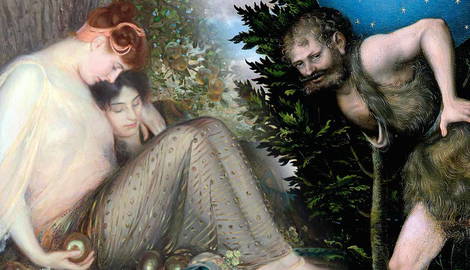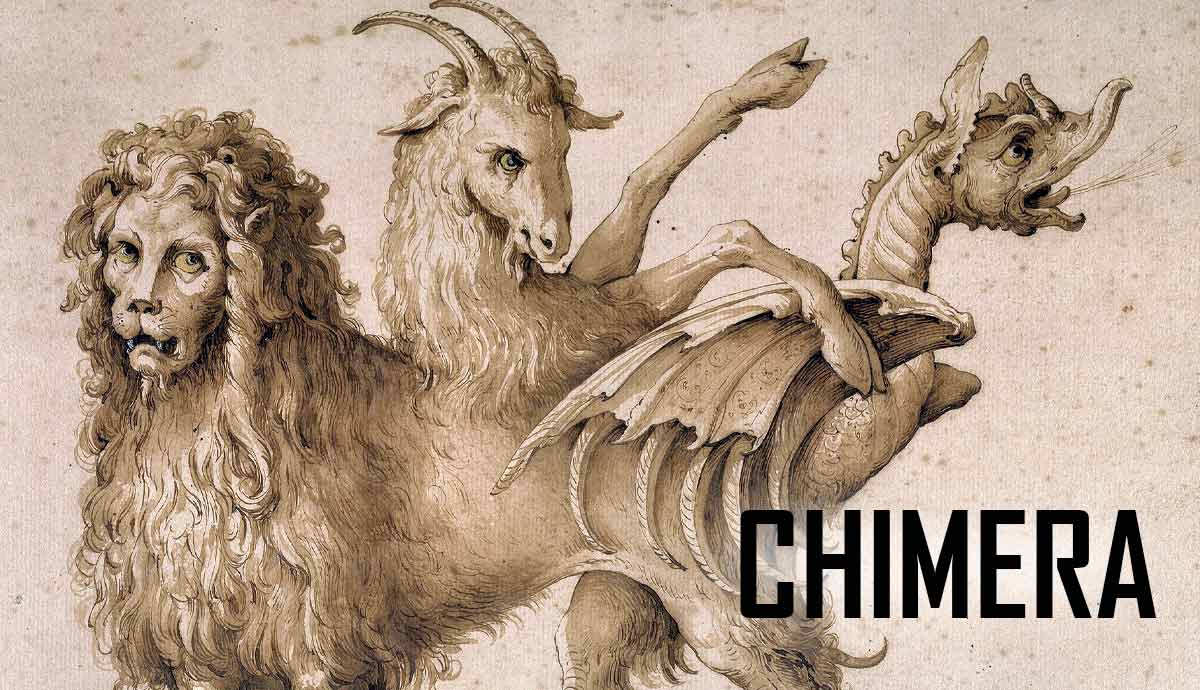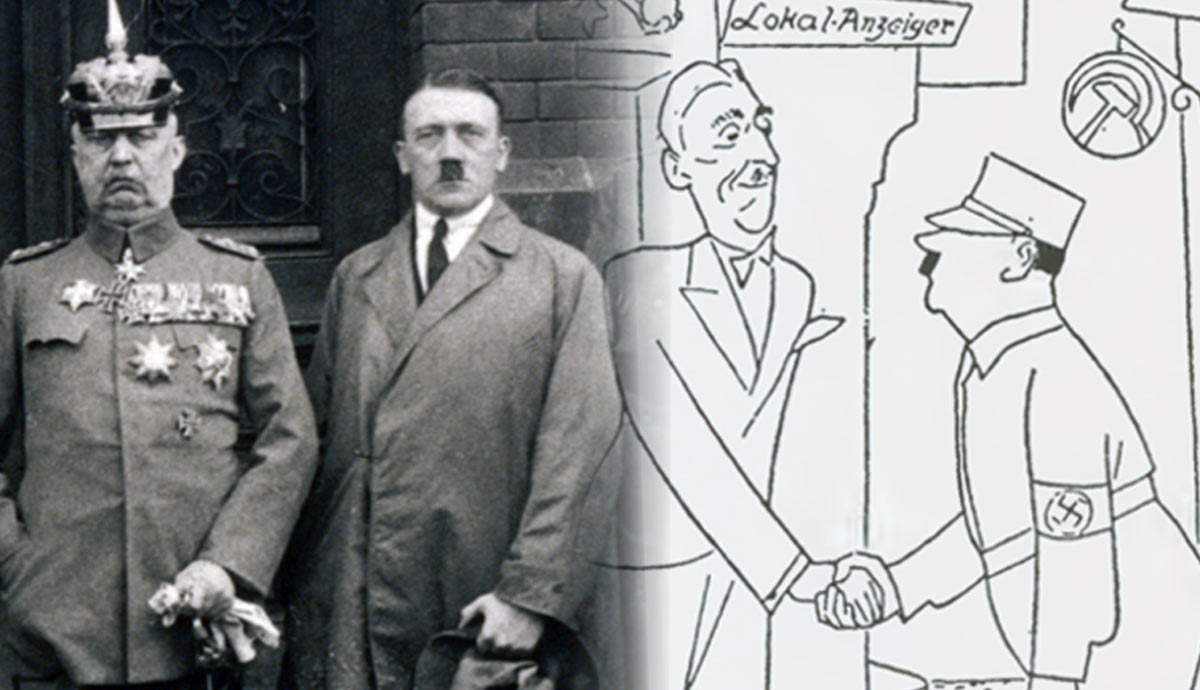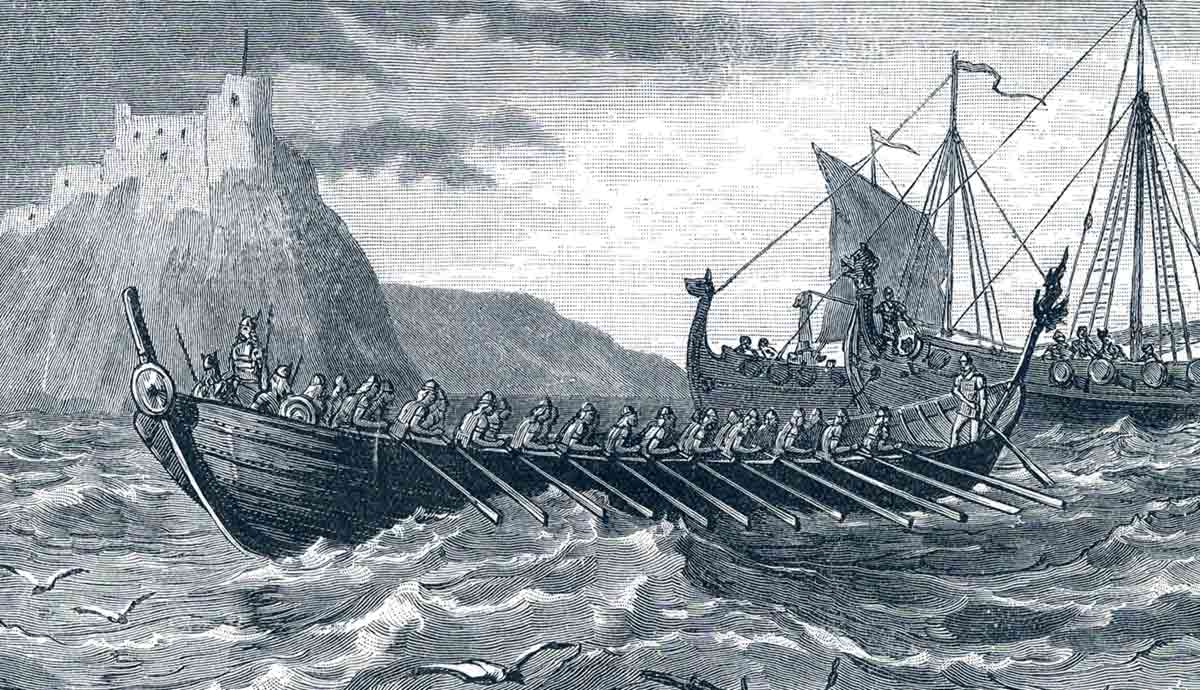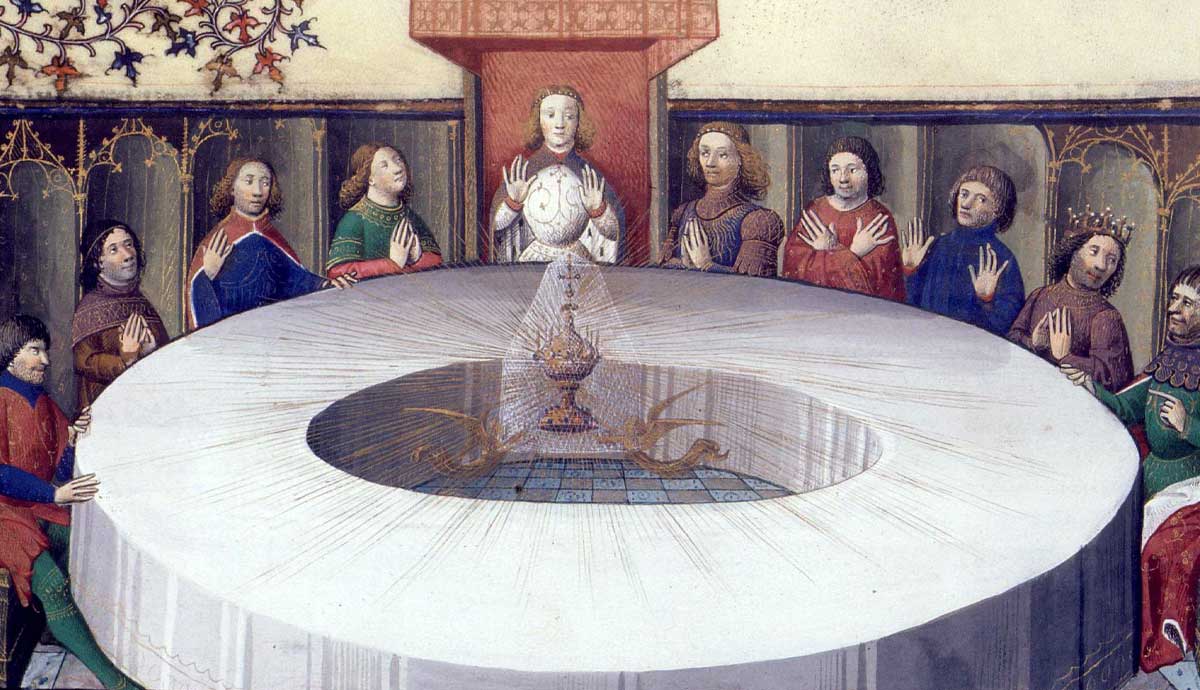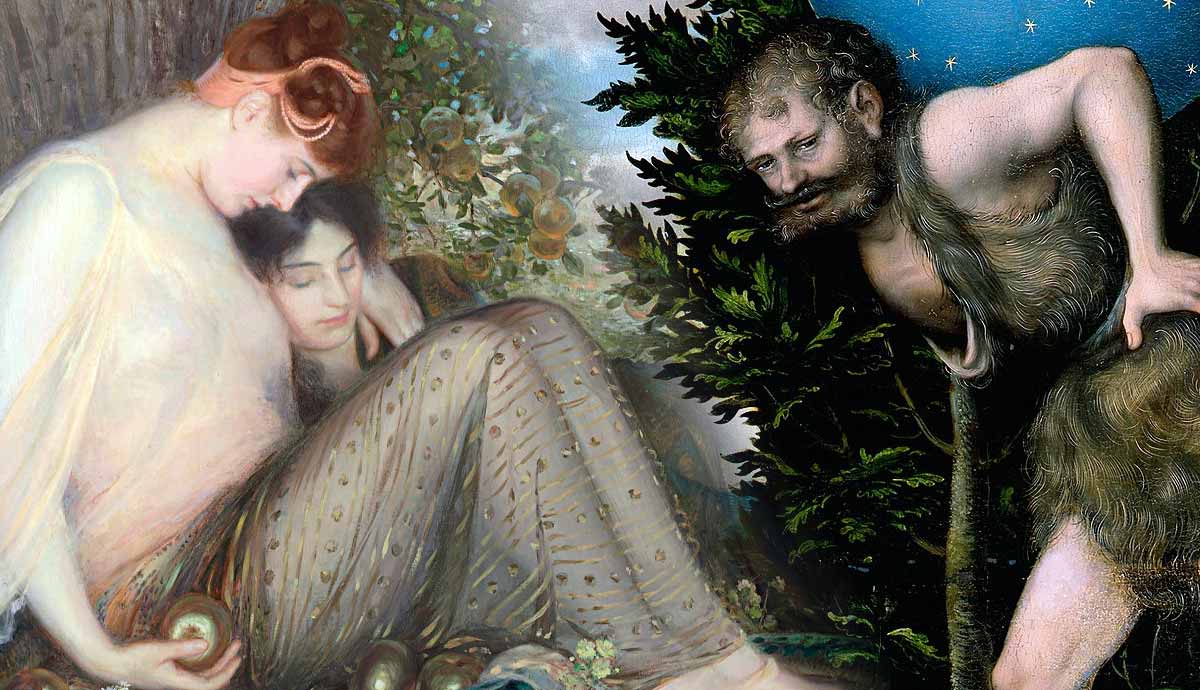
King Eurystheus commanded Heracles to steal the golden apples of the Hesperides from Hera’s Garden. This garden was located at the world’s edge and was guarded by the Hesperides and the hundred-headed dragon Ladon. Heracles journeyed across the globe to find the apples that were said to be impossible for mortals to touch. Along the way, he had to capture a shapeshifting god, wrestle giants, free humankind’s creator, and hold up the literal heavens. Learn the epic story of how Heracles found and retrieved the golden apples of the Hesperides.
The Golden Apples: Hera’s Garden

For his eleventh labor, King Eurystheus commanded Heracles to retrieve three of the golden apples of the Hesperides from the mysterious Garden of Hera. This garden, tended by the Hesperides, was said to be nestled on an island at the world’s edge. The exact location and the path to the island were a mystery to mortals and even a few immortals. Rumors abounded that the apples were forbidden to mortals, further complicating Heracles’s quest.
The tale of the golden apples begins at the wedding of Zeus and Hera. As a wedding gift, Gaia, Mother Earth herself, bestowed Hera with a branch bearing a single golden apple. It was believed that consuming one of these apples would grant immortality. Enamored by the gift, Hera asked her grandmother to plant it in a garden to cultivate more.
Gaia planted the apple on an island at the westernmost edge of the world. Hera then dispatched the Hesperides to tend to the apple grove, and the sisters diligently nurtured the orchard, occasionally indulging on a few apples. Fearing that the Nymphs of the West were depleting her precious apples, Hera assigned Ladon, the immortal, hundred-headed serpentine dragon, to guard them.
Ladon was the offspring of the primordial sea deities Phorcys and Ceto and a younger sibling to the mother of monsters, Echidna. In another version of the myth, Hera sent Ladon to guard her garden after Aphrodite stole three of the apples to help Hippomenes seduce and beat Atalanta in their famous foot race.
Over time, under Ladon’s watch, the garden of Hera developed a reputation among the Olympians as a safe place to store all kinds of artifacts, such as Hades’s helmet of invisibility, Athena’s shield, and the sandals of Hermes.
The Hesperides: The Daughters of the Evening

The Hesperides were the nymphs of the evening, the west, and sunsets. They were often referred to as the Daughters of the Evening, and most myths claim that they were the children of Nyx, the goddess of night, and Erebus, the primordial personification of darkness. However, other myths claim they were the daughters of the primordial sea deities Phorcys and Ceto or Zeus and Themis, the goddess of justice and order. Still, later myths claim that they were the children of the Titan Atlas and Hesperis, the Horae of the evening, one of the twelve goddesses of the seasons and hours. Many Roman sources argued that Hesperus, the personification of the West, was the sole parent of the Hesperides.
The number of Hesperides varies in mythical accounts, with some stories mentioning three, four, or seven sisters tending to the golden apples. However, artistic representations commonly depict three sisters. The names of the Hesperides also differ in various accounts, with some of the most widely recorded names being Aegle, Erytheia, Hesperia, and Arethusa.

The Hesperides, like all nymphs in Greek mythology, were incredibly beautiful and particularly renowned for their singing voices. Euripides referred to them as minstrel maids, and it was believed that the sweetest songs ever heard by both mortal and immortal ears flowed from the lips of the Hesperides.
While the Orchard of Hera and her golden apples are featured in several stories, such as the myth of Atalanta and the judgment of Paris, it is worth noting that the garden’s guardians, the Hesperides, never really appear in any of these stories.
The Quest for Directions

Before Heracles could devise a plan to deal with the hundred-headed dragon and steal the forbidden fruits of Hera’s Garden, he first had to find the place. Getting directions to the Garden of Hera would be the first significant obstacle the hero would face. There were contradictory rumors about its location. Some said the garden was far west beyond the Libyan Desert, similar to Geryon’s cattle. In contrast, others insisted that it was located north of the Black Sea in the mythical lands of the Hyperboreans.
Heracles was undeterred by his lack of direction and decided to pick a random direction and start walking, just as he had done in the past. He traveled to the legendary northern realm of the Hyperboreans, where griffins guarded mountains of gold, and the people only worshipped Apollo.
While traveling through the mythical land of Hyperborea, which the ancient Greeks speculated to be somewhere in northwestern Europe, Heracles encountered nymphs of the Eridanus River. They advised him to seek out Nereus, the Old Man of the Sea. Despite being a minor sea god, Nereus was one of the oldest gods in Greek mythology, being the son of Gaia and the primordial personification of the sea, Pontus. Nereus was known for his gentle demeanor and ability to shapeshift. Furthermore, he possessed prophetic abilities and famously could not lie.

After searching the coastline, Heracles eventually found Nereus fishing on a rocky shoreline. However, the Old Man of the Sea refused to help Heracles. Not one to give up easily, Heracles persisted and, as the hero was prone to do, resorted to violence to force Nereus to give him the information he needed. As Nereus attempted to flee, Heracles seized the sea god, but the slippery old man promptly altered his form.
Nereus shifted from an elderly fisherman to a fish, yet Heracles clung on. Nereus then morphed into a seal, an otter, an octopus, a sea cucumber, and even a spiky sea urchin. Despite transforming into various creatures, Heracles refused to release his hold. According to some tales, Nereus even changed into water and fire, but Heracles held fast. Eventually, Nereus relented, transforming back into a fisherman, and gave Heracles directions to the Hesperides.
Nereus informed Heracles that he had already come very close to the Hesperides when he sailed to the island of Erytheia to steal Geryon’s cattle. With this new information, Heracles decided to journey through the Libyan Desert again, hoping to locate the Hesperides or, at the very least, find Helios’s golden cup and use it to sail to the mysterious island.
The Libyan Adventure: The Sacrificial King

Heracles began his journey to the West in the East. The hero sailed from Greece to Crete and then continued to Egypt, where he started walking along the North African coastline. Early in his journey, Heracles encountered an Egyptian King named Busiris, one of the 50 sons of Aegyptus, a notable Egyptian ruler in Greek mythology.
Busiris was a cruel and inhospitable King who sacrificed all strangers entering his domain to Osiris. While traveling through Busiris’s lands, Heracles discovered the King’s appalling sacrificial practices and willingly allowed himself to be captured and taken for sacrifice.
When he was taken to Busiris, Heracles patiently waited for his turn to be sacrificed at the King’s altar. Just as Busiris was about to plunge his sacrificial dagger into Heracles’s neck, the hero flexed his muscles, breaking free from the chains that bound him. Before Busiris could react, Heracles disarmed him and plunged the King’s dagger into his chest.
After defeating Busiris’s guards and priests, Heracles ended the terrible practice of human sacrifice in the region. Some sources suggest that Heracles renamed the city that Busiris ruled over to Thebes after his hometown, while others claim that he named it Hecatompolis instead.
The Libyan Adventure: Wrestling a Giant

As Heracles continued west along the coastline of the Libyan Desert, he came across a startling sight somewhere between modern-day Libya and Morocco: a temple constructed entirely from bones on the seashore. Outside the temple stood a giant named Antaeus, the son of Gaia and Poseidon.
Antaeus kept himself amused by challenging travelers to wrestling matches. The matches followed the regular rules of wrestling, where the aim was to pin your opponent until they submitted. However, Antaeus had an additional rule — the loser had to die. The giant remained undefeated and used the bones of his opponents to build the macabre temple dedicated to his father, Poseidon.
Always eager to confront bullies, Heracles accepted Antaeus’s challenge, and the two entered the ring to begin their match. As the clash unfolded, Heracles unleashed his otherworldly strength, swiftly overpowering the giant and pinning him to the ground. However, in a shocking turn of events, Antaeus effortlessly broke free from Heracles’s grasp, defying all expectations. Heracles’s attack shook the earth and should have killed Antaeus, yet the giant stood before Heracles, looking more invigorated than before they started the fight.
Heracles fearlessly pressed on, continuously outmaneuvering Antaeus and hurling him to the ground. Despite Heracles’s efforts, Antaeus repeatedly broke free and rose to his feet, growing stronger with each fall. The relentless cycle frustrated Heracles, especially under the blistering Libyan sun. As Heracles began to tire, Antaeus appeared even more energetic after every attempt to defeat him.

Heracles, exhausted and sweating, realized he needed to change his strategy to defeat Antaeus, who seemed to have endless energy. Just when he thought all hope was lost, a familiar voice whispered in the wind — Athena, the goddess of wisdom and his greatest ally. She revealed the secret to Antaeus’s power: he drew strength from his mother, Gaia, the earth personified, every time he touched the ground. With this newfound knowledge, Heracles again prepared to face Antaeus, determined to overcome this seemingly unbeatable giant.
Heracles sprang into action, charging toward Antaeus with unwavering determination. Instead of simply toppling the giant to the ground, Heracles summoned every ounce of his strength to lift Antaeus above his head. As Antaeus struggled helplessly, Heracles tightened his grip, feeling the giant’s endless energy begin to wane for the first time. With all his might, Heracles squeezed, crushing the giant’s spine and draining the life from him.
After defeating Antaeus, Heracles continued his journey to the westernmost edge of the Libyan Desert, near the pillars he had constructed on a previous visit. The myths do not detail how he got to the island of the Hesperides, but some claim he used Helios’s cup again. With Nereus’s directions, Heracles finally sailed to the Garden of Hera.
Heracles and the Dragon

When Heracles finally arrived at the island of the Hesperides, it did not take him long to locate Hera’s Garden. While the ethereal songs of Hesperides could be heard across the island, the nymphs were nowhere to be found. Heracles could see the orchard containing the glimmering golden apples hanging innocently from the tree branches. However, Heracles also noticed one significant obstacle between him and the apples: Ladon, the immortal hundred-headed dragon. The vigilant serpent was gigantic and covered in black and red scales. It never slept, always watching for intruders who dared to take its mistresses’ beloved golden apples.

Ladon was the largest monster Heracles had ever encountered in his long life of monster-slaying. Undeterred, Heracles refused to cower in fear. Instead, he opted for a head-on confrontation with the ever-watchful dragon. Armed with his mighty club, Heracles initially attempted the same tactics he had used against the Hydra, hoping to crush Ladon’s numerous heads. However, he quickly realized this approach was futile against the onslaught of the dragon’s hundred heads.
A master at monster slaying, Heracles knew when to use the right tools for the right job. Sensing that close combat with Ladon would result in inevitable deaths, Heracles changed his tactics and retreated. Discarding his club, he drew his bow and unleashed a barrage of arrows, each coated with deadly Hydra venom.
Every arrow hit the dragon, and with a chorus of unearthly shrieks, Heracles watched the never-sleeping guardian of the golden apples fall dead before him. Once again, Heracles emerged victorious, proving his mettle by besting yet another seemingly unbeatable monster.

After defeating Ladon, Heracles entered Hera’s Garden, eager to complete his eleventh labor. Despite having heard the tales claiming that mortals could not touch the golden apples, he reached out to pluck one. However, he should have paid more attention to the stories. Whenever he tried to pick one, it vanished and reappeared on a different branch, just out of reach.
After several attempts, Heracles returned to the golden cup, fruitless. Stories claimed immortals could take the golden apples, but Heracles knew that finding and convincing one to steal from Hera, the Queen of Olympus, would be nearly impossible.
Heracles’s trial was far from over, and the hero needed to learn a trick to obtain the golden apples without touching them. Back in the golden cup, Heracles began a second quest without a destination or direction. Yet unbeknownst to the hero, his new aimless quest would lead to the freedom of one of humanity’s greatest saviors.
The Man in Chains

Heracles was at a loss about where to seek help, so he drifted across the seas, hoping the fates would lead him to his destination. After leaving the island of the Hesperides, he crossed the Mediterranean and found himself near his initial starting point in the Black Sea, close to Hyperborea. Weary of sailing, he anchored the golden cup near the Greater Caucasus Mountains and began searching for assistance.
It is unclear why the hero decided to stop by the Caucasus. Perhaps the river nymphs directed him, or maybe he was guided by a higher power. As he traversed the mountain range, he heard a hoarse voice call his name in the wind, which led him to Mount Elbrus, the highest peak in the Caucasus.
Heracles started ascending Mount Elbrus. As he reached the peak, the calls of his name became clearer, and there he saw an emaciated man bound to the mountain summit with heavy iron chains. Before Heracles could address the bound man, a massive eagle swooped down from the heavens and, in one practiced maneuver, ripped the prisoner’s liver out of his body and began to fly away.
Heracles had no idea what was happening, but the man begged for help. Not one to refuse the helpless, he took out his bow and fired at the eagle as it ascended to the heavens. Heracles’s aim was true, and within a heartbeat, the eagle plummeted back to the ground, lifeless, still holding the poor prisoner’s liver in its beak.

In the aftermath, Heracles wondered how the prisoner knew his name. Before he could ponder this further, the prisoner revealed himself to be none other than the Titan Prometheus: the sculptor of humankind and the trickster hero who stole fire from the gods to give it to humanity. As punishment for this act, Zeus bound Prometheus to Mount Elbrus, where he would endure the torment of having his liver torn out by an eagle for eternity.
Prometheus explained that he had foreseen Heracles coming to his aid, thanks to his gift of foresight. Centuries ago, Prometheus had predicted that he would one day be freed by one of Zeus’s favored children in exchange for revealing the trick of stealing the golden apples.
Prometheus, still bound, instructed Heracles to go to a mountain range on the western edge of the Libyan Desert to find his brother Atlas. He was to ask Atlas to pick the apples for him. During the Titanomachy, the war between the Titans and Olympians, Prometheus sided with Zeus, while Atlas joined the opposition against the new gods. The battle between the Olympians and the Titans was so destructive that Ouranos, the heavens, could no longer support himself without help.
After the Olympians won the war, Zeus punished Atlas by making him hold up Ouranos for eternity. Prometheus told Heracles that Atlas was on friendly terms with the Hesperides. In some versions of the myth, he was their father, and in others, they would keep him company during his eternal punishment. The Hesperides would not question Atlas entering the garden, and the Titan despised the Olympians, so he would not hesitate to steal from Hera.

After expressing his gratitude to Prometheus, Heracles wielded his mighty club and shattered the chains that bound the fire thief and the creator of humanity. Prometheus also warned Heracles that Atlas would inevitably try to trick him.
With this newfound wisdom, Heracles set off again to the west, hoping that he would return with apples in hand this time. Freed at last, Prometheus went to Olympus to seek forgiveness from Zeus and rejoined the King’s Council to prepare for another war the god of foresight predicted would begin soon.
The Trick to Carrying the Heavens

Heracles made his way to the western edge of North Africa and did not take long to locate Atlas. The Titan’s grunts and cries of frustration could be heard for miles. Aside from the Hesperides, no one had ever visited Atlas, so when Heracles approached him, it was an exciting change from the endless mundanity of caring for the literal sky for the Titan.
Putting on his best smile, Heracles explained his current predicament to Atlas. Atlas agreed that obtaining the apples from Hera’s garden would be easy for him, especially now that Heracles had slain Ladon. However, the problem was that Atlas could not go to the garden because he had to hold up the heavens. If Atlas let go of his burden, Ouranos, the heavens and sky would fall and crush all that walked on the earth.
Atlas suggested that Heracles take his place and carry the heavens while he sets off to Hera’s Garden to gather the apples for him. Atlas assured the hero it would be a perfect exchange, temporarily releasing the Titan from his eternal punishment and letting Heracles finally obtain the golden apples. With no other option, Heracles agreed and switched places with Atlas.

Heracles had endured numerous heavy burdens over the years, but they all paled compared to the weight of the heavens resting on his back. Heracles held the sky for several days without complaint. After what felt like an eternity, Atlas reappeared with a basket containing three glimmering golden apples. Atlas told Heracles that he had no trouble picking the apples and suggested that he deliver them to King Eurystheus.
Prometheus had warned Heracles that Atlas would try to deceive him, so Heracles was not surprised by the suggestion. After enduring the weight of the heavens for days, Heracles empathized with Atlas, fully understanding that no one would willingly shoulder such a burden unless forced to do so.
Thankfully, while Atlas was away, Heracles had plenty of time to devise a plan. Heracles feigned ignorance and thanked Atlas for offering to deliver the apples. Before Atlas left, Heracles asked if he could briefly take back the heavens so he could use his cloak to pad his neck and make the burden of heaven slightly more comfortable. Atlas sympathized and agreed to switch places with Heracles momentarily.
As Atlas shouldered the weight of the sky once more, Heracles snatched the basket of apples and sprinted into the distance. While Heracles sailed away in the golden cup, Atlas’s furious roars shook the earth and echoed for miles.

Heracles’s journey back to Eurystheus was uneventful, and he soon stood outside the gates of Tiryns to present the apples to Eurystheus. The king did not try to hide his scorn and annoyance at seeing Heracles succeed at another nearly impossible labor. Eurystheus accepted the apples but knew that he could not keep them. The apples were stolen and belonged to Hera, Eurystheus’s patron goddess. That night, Eurystheus placed the apples in Hera’s temple, and Athena took them back to the Hesperides before any harm could befall the king and his cousin Heracles.
After grappling with a sea god, wrestling a giant, slaying a dragon, and interfering with the affairs of the Titans, Heracles had successfully seized the golden apples of the Hesperides from Hera’s Garden, completing his eleventh labor. After enduring a decade of tribulations, only one final task remained before Heracles could be cleansed and achieve redemption for his blood crime. Eager to start, Heracles stood before Eurystheus and waited for instructions for his twelfth and final labor: capturing and bringing back Cerberus, the guardian of the Underworld.
